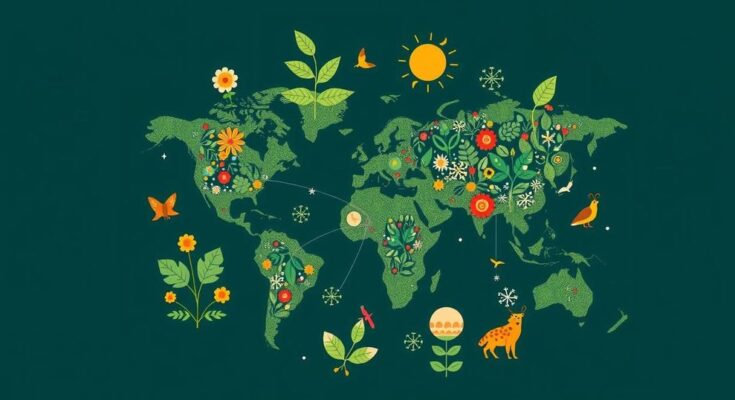The 16th Conference of the Parties (COP16) to the Convention on Biological Diversity (CBD) will be held in Cali, Colombia, from October 21 to November 1, 2024. The International Fund for Animal Welfare (IFAW) stresses the necessity for coordinated international efforts to address climate change and biodiversity loss concurrently. The conference is positioned as essential for setting the stage for forthcoming negotiations, specifically COP30 under the UNFCCC, advocating for protections for marine ecosystems and wildlife conservation.
As global leaders prepare to convene for the 16th Conference of the Parties (COP16) to the Convention on Biological Diversity (CBD) from October 21 to November 1, 2024, in Cali, Colombia, the International Fund for Animal Welfare (IFAW) emphasizes the urgent need for coordinated efforts to address the intertwined crises of biodiversity loss and climate change. According to Matt Collis, IFAW’s Senior Director of Policy, tackling these two challenges concurrently is essential: “We can’t solve either the climate crisis or biodiversity loss without addressing the other. COP16 is a pivotal moment to ensure that national and international efforts to protect biodiversity and combat climate change work in tandem, laying the groundwork for the future.” As the first of the Rio Convention COPs scheduled for 2024, COP16 will play a critical role in shaping subsequent international environmental negotiations, particularly as nations prepare to revise their climate action plans for the upcoming United Nations Framework Convention on Climate Change (UNFCCC) COP30. This initiative is supported by the 2023 COP28 Joint Statement, which highlights the necessity for a unified approach to environmental challenges. IFAW is urging participating Parties at COP16 to ensure that these commitments are reflected in the summit outcomes, notably in the high-level discussions and the Cali Declaration. The protection of marine and coastal biodiversity is also underscored as essential for both human and ecological health, given the role of marine ecosystems in carbon absorption and climate stabilization. Matt Collis remarked, “Healthy oceans are the foundation of a healthy planet. They absorb carbon, mitigate climate impacts, and support rich biodiversity. COP16 must prioritize the protection of marine ecosystems to ensure that they continue to provide these critical services in the face of escalating climate pressures.” The IFAW will host a side event titled “Leveraging wildlife conservation and rewilding to supercharge climate mitigation and adaptation” on Thursday, October 24, exploring wildlife conservation’s vital contribution to climate change solutions, along with the launch of new guidelines to aid governments in integrating wildlife conservation into their climate strategies. For further inquiries or to arrange interviews with IFAW experts during the conference, interested parties may contact Stacey Hedman at [email protected] or call +1 508 737 2558. Additional information and the agenda for CBD COP16 is accessible at the CBD’s official website.
The Convention on Biological Diversity (CBD) serves as a key international legal instrument aimed at conserving biological diversity, promoting sustainable use of its components, and ensuring fair and equitable sharing of the benefits arising from genetic resources. COP16 represents a significant milestone where global attention focuses on collaborative strategies to manage environmental crises effectively. The interdependence of biodiversity and climate action has gained increasing recognition in recent years, necessitating cohesive approaches at international forums. The upcoming conference is strategically positioned to align efforts across various environmental agreements, including the Rio Conventions, to combat pressing global challenges.
In conclusion, COP16 presents a crucial opportunity for global leaders to align efforts in mitigating the significant impacts of climate change and biodiversity loss. The collaborative framework resulting from this conference is expected to establish a robust foundation for future international environmental negotiations, particularly heading into COP30. The emphasis on marine ecosystem protection and wildlife conservation highlights the interconnectedness of these environmental crises. Consequently, the urgent call for unified action is underscored by IFAW’s advocacy and the pivotal role of COP16 in shaping a sustainable future.
Original Source: www.ifaw.org




